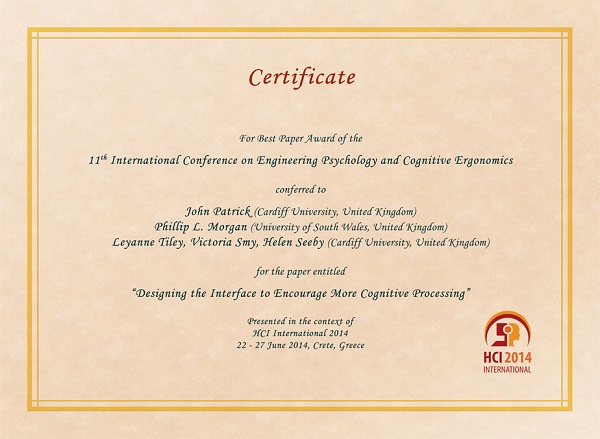

Engineering Psychology and Cognitive Ergonomics

Best Paper Award for the 11th International Conference on Engineering Psychology and Cognitive Ergonomics, in the context of HCI International 2014, 22-27 June 2014, Crete, Greece

Certificate for Best Paper Award of the 11th International Conference on Engineering Psychology and Cognitive Ergonomics
conferred to
John Patrick (Cardiff University, United King-dom),
Phillip L. Morgan (University of South Wales, United Kingdom)
Leyanne Tiley, Victoria Smy, and Helen Seeby (Cardiff University, United Kingdom)
for the paper entitled
"Designing the Interface to Encourage More Cognitive Processing"
Presented in the context of
HCI International 2014
22-27 June 2014, Crete, Greece
Paper Abstract
"Cognitive engineering aims to provide operators with immediate access to as much relevant information as possible. However, this can encourage display-based strategies that do not involve committing information to memory. To overcome this problem, a somewhat counterintuitive method is discussed, based upon the theory of soft constraints [1], that involves delaying access to some critical information by one or two seconds. This design technique induces a more planful and memory-based strategy that can improve recall, develop more planning behavior, improve problem solving, and protect against the negative effects of interruption. Furthermore, we provide some preliminary results that this more memory-intensive strategy can be trained through past experience with high access cost and then used in situations where access cost is minimal. This was the case when only half of the training trials involved a higher access cost. Further research is needed to ascertain how long training effects last and what are the ideal training regimes for different types of task."
The full paper is available through SpringerLink, provided that you have proper access rights.

